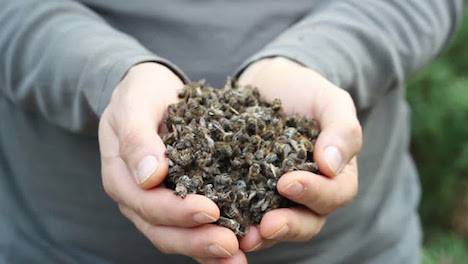By Dikran Arakelian, Blacklisted News
South Carolina honey bees have begun to die in massive numbers. Death of the area’s bees has come suddenly to Dorchester County, S.C. Stressed insects tried to flee their nests, only to surrender in little clumps at the hive entrances. Dead worker bees littering the farms suggested that ‘colony collapse disorder’ was not the culprit.
In colony collapse disorder, workers vanish as though raptured, leaving a living queen and young bees behind. Instead, the dead heaps in S.C signal a more devastating killer. The pattern matches acute pesticide poisoning. By one estimate, in one apiary in Summerville, 46 hives died on the spot, totaling around 2.5 million bees.
Walking through the farm, one Summerville woman stated it was “like visiting a cemetery, pure sadness.”
A Clemson University scientist collected soil samples from Flowertown on Tuesday, December 27, according to WCBD-TV.
The beekeepers have a clear opinion. Their bees had been poisoned by Dorchester’s own insecticide efforts, casualties in the war on disease-carrying mosquitoes.
On Sunday morning, parts of Dorchester County were sprayed with Naled, a common insecticide that kills mosquitoes on contact. The United States began using Naled in 1959, according to the Environmental Protection Agency, which notes that the chemical dissipates so quickly it is not a hazard to people. That said, human exposure to Naled during spraying “should not occur.”
Trucks trailing pesticide clouds are not an unusual sight in S.C. This is thanks to a mosquito-control program that includes destroying the insect’s larvae. Given the current concerns of Zika virus, Dorchester decided to try something different. It marked a departure from Dorchester County’s usual ground-based efforts. For the first time, an airplane dispensed the pesticide in a fine mist between 6:30 a.m. and 8:30 a.m. on Sunday.
The county says it provided plenty of warning, spreading word about the pesticide plane via a newspaper announcement Friday and a Facebook post Saturday.
Local beekeepers felt differently.
“Had I known, I would have been camping on the steps doing whatever I had to do screaming, ‘No you can’t do this,’” beekeeper Juanita Stanley said in an interview with Charleston’s WCSC-TV. Stanley told the Charleston Post and Courier that the bees are her income, but she is more devastated by the loss of the bees than her honey.
The county acknowledged the bee deaths Tuesday. “Dorchester County is aware that some beekeepers in the area that was sprayed on Sunday lost their beehives,” Jason Ward, county administrator, said in a news release. He added, according to the Charleston Post and Courier, “I am not pleased that so many bees were killed.”
Spraying pesticides from the air is not uncommon, particularly when you are covering a large area. In a single year in Florida, more than 6 million acres were sprayed with the chemicals, according to the Centers for Disease Control and Prevention. The agency argued in January that the technique should be used to curb Zika in Puerto Rico.
This particular pesticide cannot discriminate between honey bees and mosquitos. A profile of the chemical in Cornell University’s pesticide database warned that “Naled is highly toxic to bees.”
Summerville resident Andrew Macke noted that the hot weather had left the bees particularly exposed. Once temperatures exceed 90 degrees, bees may exit the nest to cool down in what is called a beard, clustering on the outside of the hive. Neither Macke nor Stanley had covered their hives.
And then came the plane…
“They passed right over the trees three times,” Stanley said to ABC 4 News. After the plane left, the familiar buzzing stopped. The silence in its wake was like a morgue, she said.
As for the dead bees, as Stanley told the AP, her farm “looks like it’s been nuked.”







